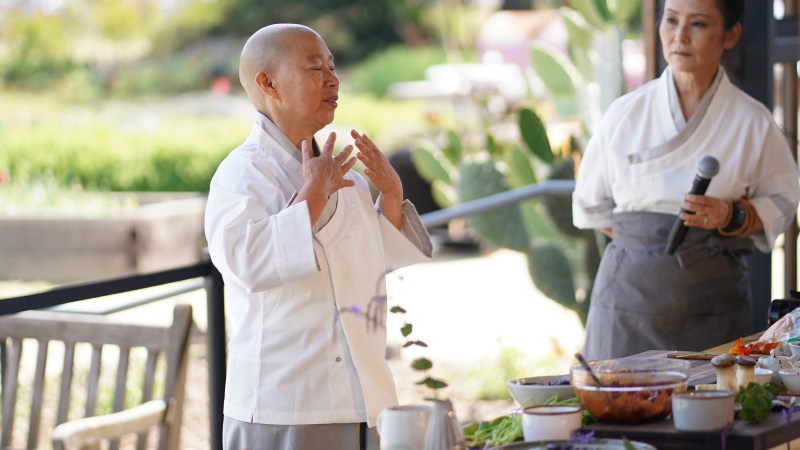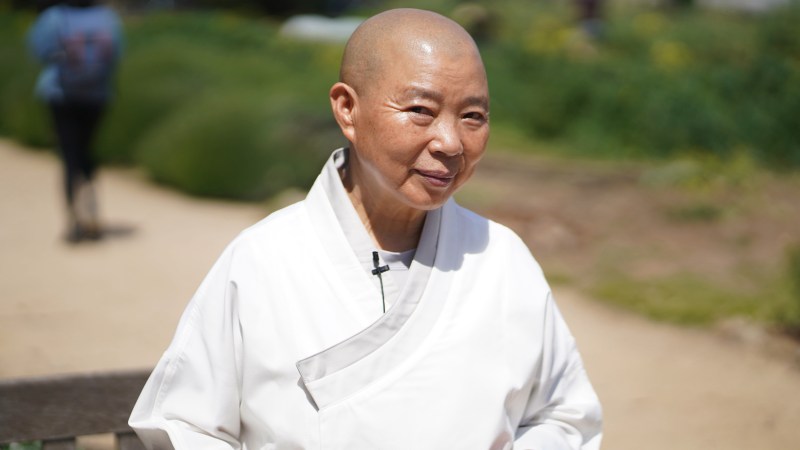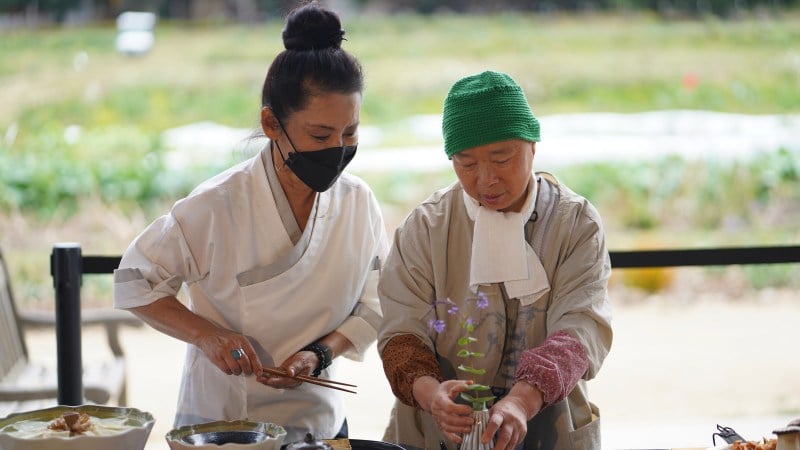Ven. Jeong Kwan Seunim perused the seasonal produce at O’Donohue Family Stanford Educational Farm on Monday when she visited Stanford to give community members a culinary demonstration of Korean temple cuisine.
In line with the plant-forward, green future the Stanford Food Institute (SFI) is paving, the Seon Buddhist nun and 2022 recipient of Asia’s 50 Best Icon Award was invited to share the possibilities of plant-based cooking at a tasting event on the Farm. This special presentation was part of SFI’s push for sustainability in Stanford’s kitchens and beyond.
Donning a green beanie, Jeong Kwan Seunim eyed the pea-green, spade-shaped leaves growing behind the barn. A mischievous smile spread across her face. She exclaimed: “가위” (scissors). With a knowing look, her assistant chef and interpreter, Yoon Hee Kim, asked for a pair of garden shears. Impervious to the buzzing commotion inside the barn, Jeong Kwan Seunim paused to hand-pick the plants she’d use to plate her “pyogo mushroom jocheong jorim” (braised shiitake).
Such is the style of Jeong Kwan Seunim. The self-taught “Philosopher Chef” — celebrated as a leader in the modern vanguard of sustainable, vegan cooking — began her demonstration by telling attendees that she is not here because she is a chef. She is here because she is a Buddhist practitioner who cooks. Never one to rush a process, she believes she must become one with her ingredients and attunes her recipes according to the life forces of what she’s cooking.

Indeed, before she began cooking, she prayed. Through her interpreter, Jeong Kwan Seunim engaged us in a chant to “prepare our bodies and minds to receive this food” we know ourselves to be “unworthy of,” yet nevertheless receive with gratitude “in pursuit of enlightenment.” Her food is for sustenance, not indulgence. Appreciating the energies that surround us, Jeong Kwan Seunim meditated on the coexistence and interdependence of all living, earthly beings.
Restoring balance between humans and the world we inhabit is central to Jeong Kwan Seunim’s cooking. No matter where she is in the world, she cooks with ingredients from her garden in Baekyangsa, South Korea, combining them with local produce harvested from her immediate surroundings. Yet the sustainable sourcing of ingredients, arguably, defers to a more salient lesson of patience. Many of her ingredients are fermented over months, or even years. She uses a five-year-aged “ganjang” (soy sauce, or as she calls it, “teardrops of the spirit”) – part of the trifecta of Korean seasonings alongside “doenjang” (bean paste) and salt. When Jeong Kwan Seunim triumphantly holds up a plump shiitake, the unassuming fungus betrays nothing of the journey it has been on. Homegrown in her hermitage, the shiitake is air-dried for a week in the cool mountain air of Naejangsan. Boiled then steamed, the shiitake returns to its plumpness. Primed to absorb more flavor than if it were freshly plucked, the result bears a wonderfully chewy texture and an accented umami.
Jeong Kwan Seunim’s culinary credo is that all ingredients have an essential form they ought to be returned to. Grounded in Buddhist philosophy, she likens this idea to formal sitting meditation, which encourages the equanimous balancing of internal and external energies.
Presenting an effortless simplicity that cradles within it an exacting complexity, her cooking nourishes its consumer and nurtures the life forces of its ingredients. Jeong Kwan Seunim’s focus on returning ingredients to their essential forms is the ultimate homage to the orchestral harmony occurring in nature. Dynamically balanced, made with intentionality and spontaneity, the finished dishes are akin to the sacred grounds Jeong Kwan Seunim draws inspiration from: nature.

When people think of Stanford, they imagine Silicon Valley and fast-paced innovation. A place of thriving entrepreneurship; an intellectual playground for the soon-to-be founder of the next big thing in tech. Not Jeong Kwan Seunim. Instead, she sees architecture deftly intertwined with nature and an abundance of green space. 5,734 miles from Baekyangsa, Jeong Kwan Seunim says she feels “right at home.” Untethered to any particular place or time, Jeong Kwan Seunim’s center rests on a steadfast belief in her calling to be a Buddhist monk. The world she perceives is steeped in those values.
Therein lies a lesson for us all. We are responsible for fashioning the kind of Stanford we wish to see. Perhaps there’s merit in occasionally getting lost on this big campus. With enough wrong turns, you might find the Ho Center for Buddhist Studies, tucked away in Building 70, which houses an excellent reference library open to all students. Or, if you meander on past Governor’s Corner, you’ll see over 200 varieties of plants growing at the O’Donohue farm.
An afternoon with Jeong Kwan Seunim reminds us that we are co-inhabitants of this planet with a collective duty to preserve it, and we are empowered to do so with the resources and communities on campus. Though this takes time and commitment, the aged ferments Jeong Kwan Seunim brought to bear are ready and admirable examples of the worthy payoff of patience. From our everyday decisions to the foods we consume, there are small changes we can make right now at Stanford to become more sustainable. This curious place we call home is, after all, really just a Farm.
Editor’s Note: This article is a review and contains subjective opinions, thoughts and critiques.
